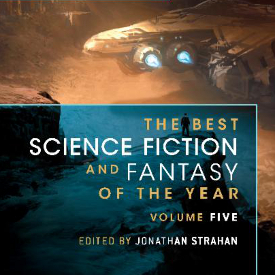Camestros Felapton has an interesting piece commenting on the The Hugo Book Club Blog’s attempts to change the rule that could eliminate a good handful of Fan-based categories and offers some sensible suggestions on how to go about doing so.
That, however, does not directly address the fact that 69 years have now elapsed since the notion of a one-off award was first rolled out at the 1953 Philcon II Worldcon.
That convention offered 7 “Science Fiction Achievement Awards” (the Hugo’s original name), all for writing or activities closely related to the writing and publication of SF LITERATURE.
The first awards were given out 11 years into the establishment of formal Science Fiction Fandom (as defined by association with and to fan-run conventions, fanzine publishing and local clubs); they were nicknamed “Hugos” by Robert Madle, a member of First Fandom, and other members of First Fandom (the handful of active fans who established the culture in the late 1930s) were continuously involved in managing the Worldcon conventions that presented the awards.
At the time of its establishment and for the first few years of its existence, the award categories clearly reflected the interests and aspects of SF Fandom that were considered important to its future existence: fiction, the “raison d’etre” of the culture, the magazines that published the fiction and/or the editor’s who managed them, the artists who realized its visions and the people who made and reinforced that culture, the Fans.
Seven categories were initially offered. That’s now expanded to 17 and I’ll submit that the reason(s) some categories may be under-represented and might be eliminated is not because they’ve lost importance over the years, but because the awards themselves have focused on becoming more commercially appealing, rather than on focusing on serving their original purpose, that of self-congratulation and recognition within a fan community.
The Hugo Awards need to reduce the number of categories it covers and refocus its efforts on the writing and Fan categories. (Why Fan categories? Two primary reasons: The body of critical analysis offered by Fans through reviews and essays, commentary and yes, erven ridicule and sarcasm, is what continuously redefines and elucidates the field. These efforts sustain the genre and the community that engages with it and should therefore be supported. The fiction awards should be maintained and perhaps expanded because the SF community long ago established that its focus would be the literature of the field (and not the “science” it was based on), (read any early history on Fandom and you’ll find that the fight between the “scienceers” and the “fictioneers” was a protracted one, ultimately won by the fictioneers) and a quick examination of all award categories will reveal that other media require written fiction in order to become something that might be worth voting on. In other words, fiction writing is at the heart of all media categories. (IF we are going to offer an award for Media Presentation, Long Form, otherwise knowns as “movies”, what we ought to be analyzing and voting on should be the SCRIPTS, not the final product. But I digress.)
Reducing and refocusing the awards on their original core purpose would most likely eliminate concerns over lack of participation. (It would likely reduce overall interest and participation, but that’s desirable as the Hugo Awards were never and should never become “popularity” awards. Below, suggestions for what that might look like:
Fiction Awards:
Novel
Novella
Novelette
Short Story
Best Series: Eliminate. “Series” is primarily a marketing-influenced creature and I’d personally contend that the field was much better off – far more creative in general – when most longer works were stand-alone, requiring all original concepts and world building for each one. Yes, recurring characters support the emphasis on characterization over concept; they also discourage creativity.
Best Graphic Story or Comic: Eliminate or substitute with Best Graphic Story or Comic SCRIPT and Best Graphic Story or Comic ART. It is entirely possible for a script to transcend bad art and for good art to transcend a bad script. The combination forces voters to judge two different media as well as their combination…not to mention that there are already plenty of other awards – better judged and by its own dedicated audience – for this category,
Best Related Work: Expand. Restrict eligibility to published works, but divide into more meaningful sub-categories: Literary Critique, Biography, History.
Best Dramatic Presentation, Long Form (Film): Eliminate or change to “Best Script….”.
Best Dramatic Presentation, Short Form (TV episode): Eliminate or change to “Best Script”
Best Professional Artist: Change. Best Professional Book Cover Artist and Best Professional Periodical Cover Artist. Covers are where the illustration meets the fiction. Other artwork is well-represented by numerous other awards; the Hugo audience is focused on literature and covers are where art intersect with that experience and expertise.
Best Semi-Prozine: Change. Publications sub-category: Best Fanzine (deliberately non-commercial); Best Semi-Pro Periodical (circulation or payment limitations); Best Professional Periodical (circulation or payment limitations)
Best Fanzine: Incorporated into publications sub-category.
Best Fan Writer: Leave the same
Best Fan Artist: Leave the same
Best Fancast: Eliminate or switch to “script” related.
Lode Star: Eliminate: YA is a marketing category, not a literary one.
Astounding: Expand to make between 3 and 5 annual recipients.
I’d prefer a much more radical approach – fiction categories only, maybe best related because we want to encourage critique, and maybe one or two art – related categories because we all love a good BEMy cover.
But, overall, the solution is not to add categories, its to re-define them after figuring out whether or not the Hugo Awards will remain an award that reflects Fandom, or if they’ll become yet another meaningless pop-culture popularity award.
If you wonder why my emphasis is placed on the written word, here is the reason:
FANDOM: “The active readership of sf and fantasy, maintaining contacts through Fanzines and Conventions.” SFE3.org.
Here is the entirety of the Featured Image:











